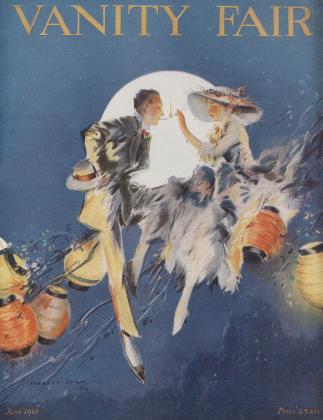Sign In to Your Account
Subscribers have complete access to the archive.
Sign In Not a Subscriber?Join NowBEAU BRUMMELLS, PAST AND PRESENT
LEANDER RICHARDSON
PERHAPS the most striking matter about Mr. Arnold Daly is that he is forever setting a task for himself which is impossible—and doing it. This has a tendency to make the onlooker feverish under the collar, and Mr. Daly appears to like that also.
It was only a question of time before he would invite comparisons between himself and the late Richard Mansfield, who occupied a place all his own upon our stage. Mr. Daly had already bearded George Bernard Shaw and left that redoubtable warrior with his beard intact and nothing to do but castigate the British nation and exhibit to Germany the error of its ways—so really there was nothing at all left for Mr. Daly to do but to pass on to the unconquered Mansfield. It may as well be admitted that Mr. Arnold Daly's Beau Brummell is exceedingly creditable, even as viewed alongside the earlier impersonation of Mansfield. It is an elegant figure that Mr. Daly makes for us, and the tone of it is sincere. This Beau Brummell is entirely human under all the veneer and artifice of time and situation. You are sorry for him when the showdown comes. As the performance proceeds, your mind goes back to Mansfield every little while. You cannot help it. You have not felt the same way about Mansfield. His characterization had been letter-perfect, but you had not been sorry. Why?
Probably because Mansfield was athletic, while Daly is frail. Somehow it is not easy to choke up over the sorrows of the robust, while the tear-ducts open readily enough at the lightest touch of the frangible. So, we had more laughs with Mansfield's Brummell than we have with the Brummell of Daly, but when it comes to the finality, we feel rather closer to the Daly Brummell than we did to the Brummell of Mansfield.
YET the Mansfield Brummell was the point of origin or creation. It was Mansfield who put Brummell upon the map, so far as the theater is concerned. The idea came to him, so the legend goes, from a famous dramatic critic—this was long ago when a critic might have ideas without asking permission from the advertising department. This dramatic critic drew the attention of the struggling Mansfield to two points—first, that there was an old comedy by Blanchard Gerrold, called "Beau Nash," which contained many attractive qualities; and second, that Mansfield had in his employ as secretary a young man named Clyde Fitch, who was saturated with talent and ambition, yet might have something in him. Who really wrote "Beau Brummell" may never be known to a finality. Fitch gave Mansfield credit for "many valuable suggestions." Mansfield paid Fitch $1,500 for his part of the entertainment, which at that time, to a youth unknown to fame, was prodigal compensation for whatever he may have accomplished. And so the interrogation remains.
 View Full Issue
View Full Issue












Subscribers have complete access to the archive.
Sign In Not a Subscriber?Join Now